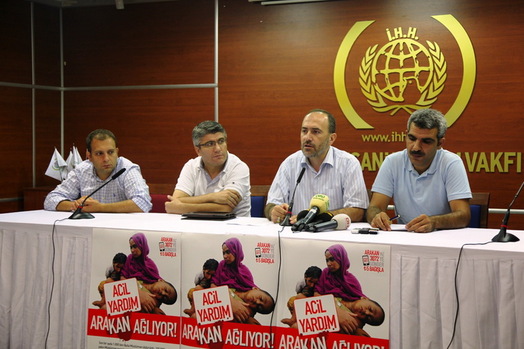
Oruç, who is also a member of the IHH’s executive board, said the goal of the IHH, which has been carrying out relief efforts in the region for years, is to bring the problems in Arakan to the world’s attention and to help the people there. He noted that the IHH has been doing its best for years to help the people in Arakan.
Tyranny continues in the region
For his part, Demir gave information about the IHH’s years-long relief efforts in the region and said there is a brutal massacre and tyranny in Arakan today.
“We were making efforts to bring the atrocities in Arakan to the world’s attention but a Buddhist helped us by sharing a video in the social media of the massacre they commit. They helped us to achieve our goal,” Demir said.
“It is said the brutalities in Arakan which came to the international agenda has increased pressure on the Myanmar government, leading to the massacres in the region to slightly weaken. However, this is not the case. Massacres, rapes and torture continue at full speed particularly in rural regions. Humanitarian relief organizations and journalists are still not allowed to enter the region. The Muslims who flee Arakan take refugee in camps in Bangladesh but there also big problems in those camps. The circumstances of the camps are really heartbreaking. When you see those camps, you can guess what kind of a brutality those people fled and preferred to live under such terrible conditions,” Demir added.
‘Death is like a way of salvation’
A Haber editor Fatih Er who is one of the journalists who went to Arakan said he went to many refugee camps in various parts of the world but he never witnessed a tragedy similar to the one in Arakan.
“I am not an emotional person but I cried when I learned that some people fled Arakan on boats. These people were not fleeing in order to live in better circumstances, they were just fleeing tyranny… Death is like a way of salvation for those people,” Er said.
“UN is always silent”
Impressions of Sağırlı, a journalist from Türkiye newspaper, on Arakan are the same with the impressions of Er.
“I visited refugee camps in all the conflict regions of the world but I have never seen worse conditions than those on the Bangladesh-Arakan border. The world has turned a blind eye to these people. Why does the United Nations keep silent? Why does not it intervene in regions where Muslims are massacred? Why does not UNICEF see the plight of children in Arakan? It is high time for the Organization of Islamic Cooperation (OIC) to raise its voice concerning the massacre in Arakan,” said Sağırlı.
Stressing that photographs released by some media outlets do not reflect the facts in Arakan just like some news articles which claim that violence in the region has weakened, Sağırlı added: “If you stand in a point in Arakan and take a photo by turning 360 degrees, this can bring you a Pulitzer prize. UN officials who go to the region meet with Arakanese Muslims in the presence of Myanmar security forces. So, in the presence of the security forces, people cannot tell the UN officials about the atrocities they go through. Several people who talked about the tragedy in the region were later found dead. Under these circumstances, how can Arakanese Muslims tell what has been taking place there?” he asked.
Charity givers who would like to make donations for the Muslims who live under difficult circumstances on the Myanmar-Bangladesh border could make their donations online via www.ihh.org.tr or by giving a call to the IHH from the +90212 631 21 21 phone number.
Please click to have a look at IHH’s report on Arakan which includes detailed information about the region.